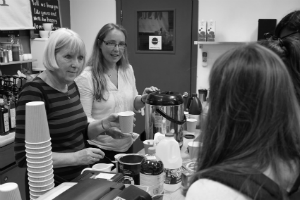Vital leadership that enables pioneer mission
Missional clusters which are 'small enough to know everyone but large enough to do things' - Andrea Campanale is heartened by a visit to Morden Baptist Church
Recently I visited
Morden Baptist Church in South West London and came away full of hope and excitement. I was leading a team of students on a Church Mission Society (CMS) ReSource weekend.

These weekends involve experiencing a diverse range of projects doing something new in terms of mission or church. I’d heard the Baptists in Morden had a number of missional clusters in order to reach a variety of people groups within the wider community. These included those using a local park, families with young children in a nearby primary school, people who do not have English as their first language at a library, staff and customers of a coffee shop and residents on an adjacent housing estate.
A couple of us attended each cluster and we all came back full of admiration for what was going on there. I went to the school. There were craft activities, games and an opportunity for people to bring and share their favourite food. It was lively and informal and the parents I spoke to talked of how great it was to have a place where they could do fun things with their children but also get to know others and feel part of community.
What really struck me was the commitment of each of the teams leading a cluster. Not only were significant relationships being built with those outside of the church, but very real and meaningful discipleship was evident amongst the church members and the new converts who had come to faith as a result of the missional activity.
It felt to me that this congregation had got the balance just right. There was resourcing from the centre while each individual team had the freedom and authority to creatively respond to the needs of the people they were seeking to befriend. Children and young people were as much a part of the mission as the adults and they participated in prayer, conversation and the planned activities along with everyone else. There was also a more conventional Sunday morning worship service held in the church building for those for whom the cluster model doesn’t work.

Having visited the different clusters, the pastor, Gav Murray, explained how they came about. '10 years ago we felt God gave us a vision to make 3000 disciples. This was staggering for a small church!
'It challenged us to ask - how do you grow to that number by genuinely adding new disciples while maintaining community? We looked to
St Thomas, Crookes in Sheffield and their model of building and replicating 50-strong, mid-sized communities. These are small enough to know everyone but large enough to do things.
'The other factor we recognised was that people weren’t going to come to us. In order to fulfill the great commission, we needed to go beyond the church building.'
He then talked about how the individual teams are resourced and released into mission. 'Each week I produce teaching notes and our youth and children’s workers provide activities so that the whole church is going through the same material. We gather our leaders once a month for support, pastoral care, teaching, envisioning and strategising, as well as sharing testimonies.
 |
|
Pastor Gav Murray |
'In this way we all know what each other are doing and it promotes unity. Christendom elevated the pastor/teacher but we are building an environment where all five ministry gifts are equally valued. As I fit more in the ‘apostolic’ gifting, I understand how the pioneers in my congregation tick. We also seek to honour failure and create a culture where it’s good to try new things even if they don’t work out.'
His approach both made me want to shout with joy and sob at the pain of my own experience! As he shared, I became acutely aware of the urgent need for mature and secure leaders. It is vital if they are to let go some of their power and trust those who have the vision and creativity from God within their congregations to start innovative mission projects.
But then, to not just leave them to get on with it either - rather prayerfully support their ministry by encouraging them, equipping them and ensuring they still feel part of the whole work of the church that they’re an integral part of furthering. Gav sums this up as, “low control, high accountability”.
Too often those who see the failures of the status quo and have an idea of what could be done differently are viewed by church leadership as subversive and potentially divisive.
Yet if pastors or ministers could listen and work with this dissenting voice, the church will be renewed and the gospel can once again go forth to have a significant impact on the unbelieving majority in the UK.
Andrea Campanale is a mission partner with CMS and is just completing its pioneer course. She leads and trains teams in outreach to spiritual seekers at Mind, Body, Spirit type events and has set up her own missional community in Kingston-upon-Thames. Her blog can be found at http://sacredspacekingston.com.
Baptist Times, 03/02/2014